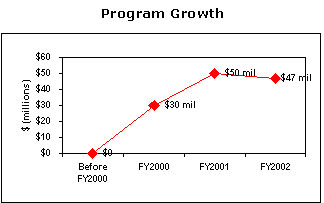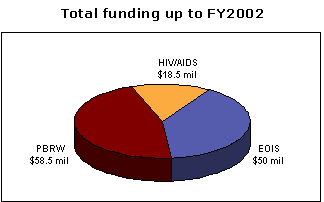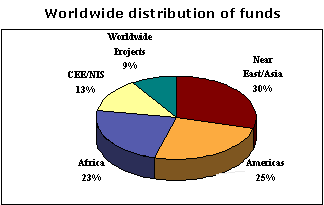|
Origins of the International Cooperation Program
The United States Department of Labor (USDOL) began its international efforts in 1950 when
the Department trained German trade unionists to assist with European reconstruction. Since
then, The Division of Trade Agreement Administration and Technical Cooperation (TAATC)
in USDOL has been actively involved in international
work in partnership with organizations such as the World Bank, the U.S. Agency for International
Development (USAID), and other governments. USDOL worked with the Saudi Arabian government in
1975 to develop and implement a vocational training program. In 1989, with the passage of the
Support for Eastern European Democracy (SEED) Act, USDOL has worked with USAID in Central and
Eastern Europe to help transitioning economies develop labor market systems that support free
and open economic markets.
Beginning in 1997, the world saw the devastating social impact that the Asian Financial
Crisis had on individuals as well as whole societies. In Asia alone, it is estimated that over
20 million workers lost their jobs during the subsequent recession - in Indonesia, the
percentage of the total population living in poverty increased to almost 50 percent. The impact
on female, child, and migrant workers was particularly severe. Most workers lacked any kind of
unemployment insurance, pension, or other social safety net that could have helped mitigate the
negative social impact of this economic crisis. The Asian Financial Crisis highlighted the
importance of establishing adequate social safety nets and protecting basic worker rights in
supporting short-term economic reform and long-term economic growth.
At about the same time in June 1998, the International Labor Organization (ILO) adopted the
Declaration on Fundamental Principles and Rights at Work, which introduced a new mechanism
holding its member states accountable for promoting and protecting four core labor standards:
- Freedom of association and the right to collective bargaining
- Elimination of all forms of forced or compulsory labor
- Effective abolition of child labor
- Elimination of all forms of employment discrimination
The broad support of business and labor groups, both in the U.S. and abroad, as well as
political support for the ILO Declaration on Fundamental Principles and Rights at Work, coupled
with concern about the Asian Financial Crisis, underscored the need for the U.S. to play a more
active role in furthering the implementation of core labor standards and the development of
social safety nets. Countries in Central America, Southeast Asia, Eastern Europe, and Africa
were also increasingly looking to the U.S. and other industrialized nations for assistance in
these areas, and the ILO Declaration, in recognition of the obligation of the ILO to assist its
members, committed the ILO to offering technical assistance and advisory services to promote and
realize core labor standards, including the mobilization of external resources and support.
Program Growth
In Fiscal Year (FY) 2000, Congress began appropriating funds directly to USDOL to implement
international cooperation projects in the areas of strengthening social safety nets and
protecting basic rights of workers. A total of $30 million was appropriated in FY 2001 ($10 million for social safety net programs and $20 million for the initiative to protect the basic rights of workers). In FY 2001, funding
increased for these two program areas increase to $40 million and USDOL was also given $10
million in funds to implement workplace-based HIV/AIDS program. The total amount appropriated
for these projects in FY 2002 was $47 million.

Current Funding Levels
From FY 2000 - FY 2002, Congress has appropriated a total of $127 million for USDOL’s
International Cooperation Program. USDOL is implementing 80 projects in 69 countries with these
funds, both country-specific and regional. Projects vary in size and scope according to country
priorities, need, and intervention strategy.

Geographical distribution of current project funds:
- Worldwide projects - 9%
- Central/Eastern Europe and Newly Independent States - 13%
- Sub-Saharan Africa - 23%
- Americas - 25%
- Near East/Asia - 30%

Program Implementation
Countries participating in USDOL/OFR’s International Cooperation Program are selected based
on a variety of criteria, including demonstrated need, commitment by the government and worker
and employer organizations, institutional capacity to absorb resources, and sustainability.
Once agreement has been reached on where to target funding and for purpose, staff of OFR work
closely with the host country partners (government, employer organizations, and worker
organizations) to set the objectives of the project and to define the respective roles of
USDOL/OFR and the relevant stakeholders in managing and implementing the project.
USDOL/OFR’s International Cooperation Programs seek three main goals: Improving
Economic Opportunity and Income Security for Workers (EOIS), Protecting the Basic Rights of
Workers (PBRW), and Improving the Workplace Environment through HIV/AIDS
Prevention Education (HIV/AIDS). To achieve each goal, USDOL works in cooperation
with representatives from government ministries, employer organizations, worker organizations,
and non-governmental organizations (NGOs) to strengthen the capacity in these areas.
USDOL works with partner organizations with relevant expertise and technical knowledge to
design and implement International Cooperation projects. Actual implementation of project
activities is done by a variety of entities - other USDOL agencies with relevant technical
expertise (such as the Occupational Safety and Health Administration), other U.S. Government
agencies (such as the Federal Mediation and Conciliation Service), and a variety of consultants,
non-governmental organizations, and firms that are awarded contracts and grants by OFR. USDOL
provides management oversight of the entire program and ensures that projects are being
implemented effectively. Consultations with key stakeholders, including the partner
organizations and the tripartite members, take place throughout project implementation.
| |
|



